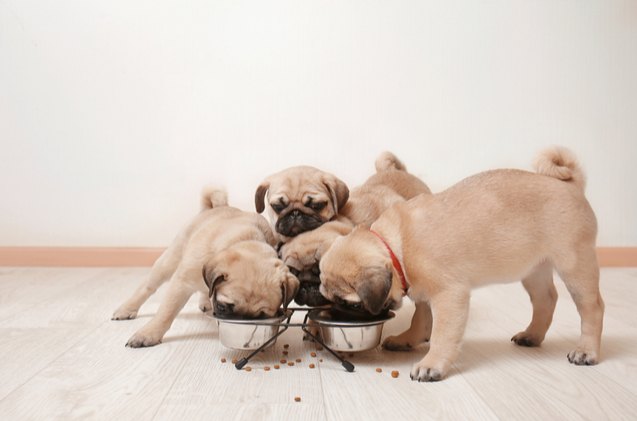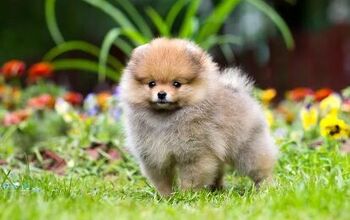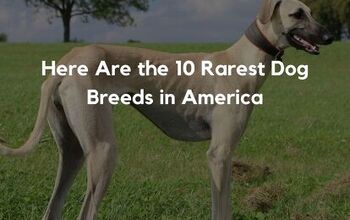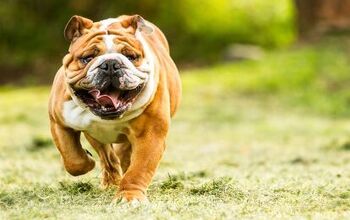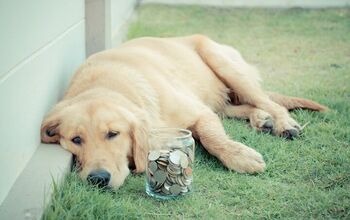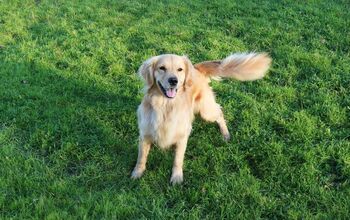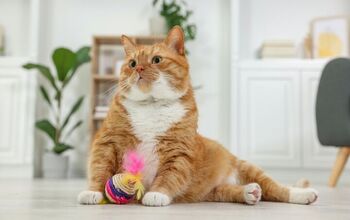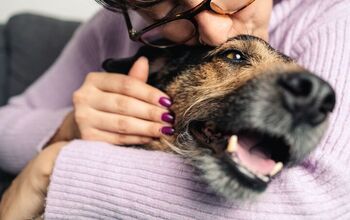Top 10 Greedy Dog Breeds

We’ve all known them. That dog or cat that always seems to get their fair share and then some.
Our black Lab would actually pick up his canine brother’s half-full food dish and walk away with it before said sibling had even finished his meal. When presented with Milk Bone treats, this same dog would inspect both being offered up, and reject any that were broken or incomplete, always opting for the larger bone. I had a cat that would cover errant bits of food that had fallen out of her bowl, with her paw so that she could continue eating without any of the other felines noshing down on this bit of kibble before she could.
So, for all those pets that are well taken care of, that have never had to worry about where their next meal is coming from, and who know how to cajole their pet parent out of the maximum allowable treats, I ask “what’s up?”. Why the piggy mentality?
Well, this need for feed may not always be greed. While some breeds seem to be hard-wired to eat… and eat, and eat, others may have more complex reasons. Did you know for instance, that older dogs are typically hungrier than younger dogs? Or that, low-protein / high carbohydrate diets can leave your pooch feeling constantly hungry. Free-feeding multiple dogs can cause them to wolf food out of fear they may lose out, and go hungry. There may even be health-related culprits such as Cushing’s syndrome, diabetes or parasites that are causing his food obsession.
But assuming his diet is right for his size, age and activity level and this obsession with chowing down isn’t new, but is typical of your dog’s dining behavior, where do you go from here?
We’ve put together our top 10 list of dog breeds renowned for having greedy tendencies, along with some tips and tricks as to how to help turn your little moocher around.
While you’ll never have to worry about this low-slung pooch snatching snacks off your kitchen counter, his determined nature means he’s cool with just hanging out and making constant eye contact until you finally offer up a bite of what you’re eating. In fact, his tenacity and strong sense of smell have earned him the title of the only breed certified to hunt above and below ground. Yes, whether he has picked up the scent of a small burrowing animal or that chocolate bar wrapper you just threw in the garbage, he won’t stop until he gets what he wants. Now, he can also be prone to Cushings Syndrome, which means his persistence related to food may need to be examined more closely by your vet. And, if your little wiener dog is part of a multi-dog family, his greedy behavior may be related to a fear that he won’t get his fair share. Consider feeding him separate from other pets. (photo credit: Masarik/Shutterstock)
Surprised? Just kidding. Anyone who has parented a Lab knows this boy loves to chow down. In fact, this dog enjoys his food so much he considers meal-time an all-day event – so you need to be careful about monitoring his intake. That said, a recent study has shown that some (not all) Labrador Retrievers carry a gene that prevents their brain from recognizing the sensation of feeling full after a meal. So, it’s less about being greedy and more about feeling genuinely hungry. Because Labs love an outdoorsy, active lifestyle, its important to ensure his kibble is sufficiently high in protein to help support this output of energy and keep him feeling satisfied. Your vet may also be able to recommend a brand that’s specifically designed to help curb this breed’s voracious appetite. Above all else, avoid allowing him to become obese – which can be common with this breed. Structure his meals and forget about ever free feeding this boy. (photo credit: PixieMe/Shutterstock)
While some dog breeds will eat till they’re satisfied (mine will even leave a handful of kibble in their bowl if they’ve decided they’ve had enough), this pooch will continue to eat as long as you keep filling his dish. Hungry or not, he’s happy to indulge in whatever you may toss his way. And because he’s of the smaller, toy breed variety, he doesn’t burn off the same number of calories that a larger, active dog does, so will be prone to obesity. To help pace this little guy’s food consumption, consider introducing a puzzle bowl or one of the great new snuffle mat s available on the market. Either option will ensure your dog still gets to enjoy his full meal, but it will cause him to spend more time rooting around to find it. The end result, he’s less likely to be done and waiting for more. (photo credit: gumichan/Shutterstock)
In fairness, brachycephalic dogs – those with flat faces – are naturally challenged when it comes to eating both wet and dry foods. Without the longer beak, they have to bury their face into their food and gulp air in order to breathe as they eat. This makes for messy faces but also the inevitable flatulence that comes from having to inhale while swallowing. And while this alone may unfairly brand him as being greedy, truth is the Pug really is known for having a fierce appetite and eating anything and everything he finds. Add to that his determined personality and that adorable, bug-eyed expression – clearly designed for successful begging – and you have a little dog who lives for food. But any breed willing to eat indiscriminately needs to be checked out for worms. They will cause him to be continually ravenous and over time, cause more serious illness. If uncertain, get him diagnosed and treated by your vet. (photo credit: Africa Studio/Shutterstock)
This busy boy is renowned for his exceptional sense of scent and is a favorite breed of hunters because of his highly responsive nature and ability to track. While his laid-back personality also makes him a great family dog, that innate ability to sniff out everything from other animals to contraband at the airport makes him a natch for exploring garbage bins and obsessing over errant treats under the sofa. But Beagles can also be prone to Cushing’s Syndrome. This malady is normally the result of a benign pituitary gland tumor that will cause a spike in his consumption of food and drink. Blood tests can confirm whether your dog has been afflicted and, if yes, it can be controlled through medication. If his results come back clean, then you may want to chat with your vet about the ideal kibble mix for this active dog. A higher protein format may help curb his need to gobble. (photo credit: Soloviova Liudmyla /Shutterstock)
This brawny boy comes from hard-working stock so an active lifestyle will help keep him mentally and physically fit. Remember that, because similar to the Labrador Retriever, research has found that a percentage of Rottweilers (not all) have a defective gene that prevents their brain from triggering that “feeling full” sensation. In short, regardless of how big a meal he’s just consumed, he’s back for seconds and always mooching because he’s genuinely hungry. While your particular dog’s greedy tendencies may not be down to a defective gene, you need to ensure unlimited access to food is curbed. An overweight Rottie with hip and joint issues will never enjoy the full, active life that he deserves. Solution? Try establishing set meal periods and when he’s finished, remove his bowl. This signals to him that the all-you-can-eat buffet is closed – no more food is coming. And introduce a strict no sharing of human food policy with your family. (photo credit: Michelle D. Milliman/Shutterstock)
The Corgi is another breed that is willing to scarf down whatever he happens to find – whether in his food dish, the cat’s food dish or discarded on the sidewalk. Because he was bred to herd, this pooch is both focused and determined which means that whether its an errant sheep that needs corralling or a dropped potato chip that needs eating, he’s all over it. But while you may think this high-energy pup deserves an extra heaping helping of food to support his activity level, you’d be wrong. With any dog that has a long, low-slung back, obesity can present big health problems and this breed is particularly prone to intervertebral disc disease which can lead to serious mobility problems including paralysis. So, with a dog that is absolutely driven by praise and rewards, consider offering up healthier treats that are high-protein, low-fat and definitely non-human food. (photo credit: rotsukhon lam/Shutterstock)
This handsome little guy has a fairly high metabolism so while he doesn’t pack on the pounds as quickly as some other breeds might, it doesn’t mean constant snacking is okay. In fact, in spite of his generally obedient manner, this breed can be quick to snatch a treat (human or doggy) right out of your hand if he feels its dangling too close to his face. Yes, he is food driven and like most dogs will seize any opportunity to eat. How to get this often-frustrating behavior under control? Once you have established the ideal diet and feeding routine for this handsome pooch, stick to it and give treats sparingly and only when earned. Make sure those tasty extras are healthy and not of the human-variety (in other words, no table scraps). And while weight isn’t a problem when he’s young, this breed is prone to obesity as he ages and that isn’t the time to start him on a new feeding schedule. (photo credit: Switlana Symonenko /Shutterstock)
It won’t come as a surprise that this stocky boy loves his food and will happily scarf down anything given to him. But with a brachycephalic facial structure that makes breathing during exercise (or heat) a challenge, obesity with this over-eater can quickly become a serious problem. Because English Bulldogs are known to be indiscriminate when it comes to food, avoid giving him unlimited access to food. Forget about free-feeding this pooch, establish set meal periods. Don’t feed him table-scraps that will set an expectation and cause him to mooch. And remember that dogs are opportunistic. They are hard-wired to eat whenever food is available – hungry or not. Additionally, because this breed’s physical structure doesn’t allow him to digest food well, he known for not only being greedy but being extremely flatulent. So, you’ll both pay the price if you over-indulge him. (photo credit: WilleeCole Photography/Shutterstock)
How can you resist slipping a little something to the mournful face of a Basset Hound looking up at you from under dinner table? Learn by establishing a firm, no-mooching policy in your home. Remember that this hunting breed possesses a pack mentality which means that whether he’s hungry or not, he will eat whenever and wherever the opportunity presents. And that includes from his dish, your plate, or the bowls of other pets. Feed him separately if you see him stealing from others and ensure it’s a quality kibble (no carb fillers) so that you feel confident that hunger isn’t driving him. And because this breed is prone to obesity, its important you ignore his pleas to just keep the chow coming. Like most dogs with low, long backs, when he packs on pounds, he risks serious joint and back issues including paralysis. So, instead of table scraps, why not feed your dog’s oral fixation with some serious chew toys. (photo credit: Anna Tronova/Shutterstock)

Sharing space with three seriously judgy Schnoodles and a feline who prefers to be left alone. #LivingMyBestLife
More by Mary Simpson



